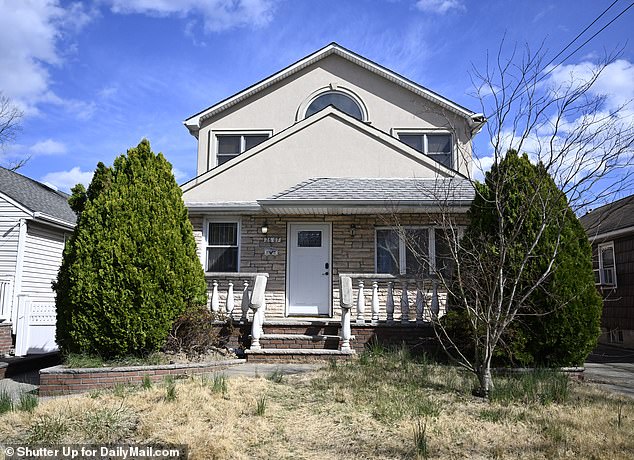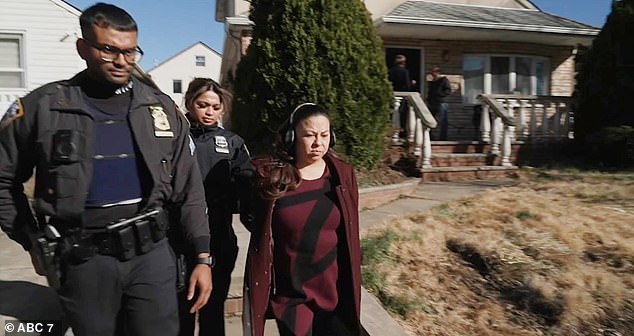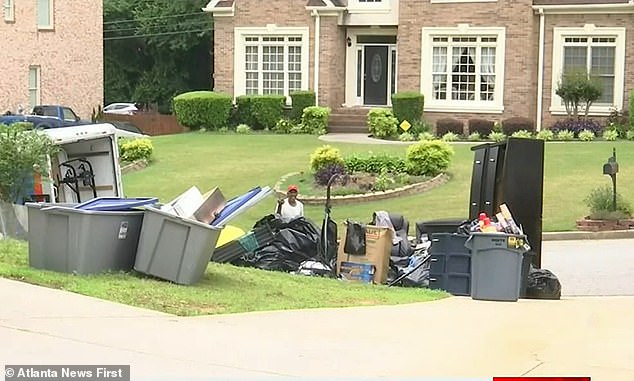Squatting is a growing concern for homeowners across the United States.
Just this week, two alleged squatters were forced to flee a home in Queens, New York, after being confronted by the media.
It came after the owner was surprisingly arrested following a heated disagreement with the squatters, who were claiming tenant rights in the million-dollar property.
The incident was just the latest in a series of clashes across the country, in which homeowners are increasingly frustrated by laws that make it difficult (and extremely expensive) to remove unwanted inhabitants from their properties.
Searches for ‘squatter insurance’ and ‘squatter coverage’ are at an all-time high, according to a personal finance site Homeowner.
But currently only one insurance company offers protection against unwanted home invaders. And it is only for those who offer their homes for short-term rental.

A property in Queens, New York, was at the center of a dispute this week
Squatters’ rights are a common law principle in which unauthorized squatters take advantage of legal loopholes in an attempt to assert residency in unoccupied homes.
To evict a squatter, homeowners face significant financial losses in the form of legal fees, potential property damage, and loss of income.
Evicting squatters can also be an arduous, months-long process, due to court delays and overwhelmed police forces across the country.
Reports of angry homeowners who have been unable to remove squatters from their homes have multiplied in recent months, with some “serial squatters” refusing to leave their residences for more than a year.
And the problem increasingly affects those who rent properties on the Airbnb or Vrbo platforms.
Americans run the risk of a guest overstaying their welcome and becoming a legal and financial headache.
‘Tenant from hell’ Elizabeth Hirschhorn made headlines last year when she refused to pay rent on a luxury Airbnb rental in California for 570 days.


Homeowner Adele Andaloro ended up being arrested after a heated disagreement with squatters at her million-dollar home.


A woman left Andolaro’s property in Flushing, Queens, earlier this week covering her face.
Currently, Proper Insurance is the only company that offers specific squatter coverage.
The company, based in Bozeman, Montana, specializes in insurance for short-term rentals.
The company introduced the add-on a few years ago in response to demand from short-term rental owners, Graham Anderson, claims director at Proper Insurance, told DailyMail.com.


Proper Insurance added squatter coverage in response to demand from short-term rental owners, said Graham Anderson, director of claims.
Since the company introduced the add-on, the acceptance rate has been very high, he said, and the number of complaints has also increased.
“Many people who own these short-term rental properties don’t realize that a specialized policy is necessary or that it’s very helpful to have one,” he said.
“People are surprised all the time by not realizing that they need specific, special coverage.”
The loss of income an Airbnb host could face if they have a problem with a squatter could be really significant, he added.
Proper Insurance offers $10,000 in coverage for loss of rental income and $5,000 in coverage for legal expenses.
But the cost of evicting a squatter can vary greatly by state and circumstances, and in some cases can cost hundreds of thousands of dollars.
One homeowner was forced to sell his home because he could no longer stand the fact that someone could stay on his property for so long and was suffering such a loss, Anderson said.
Proper Insurance is the only company currently offering coverage for squatters, but Anderson isn’t sure other companies will be able to follow in their footsteps just yet.
“Historically, insurance companies, especially big insurance companies, are slow to make those changes,” he told DailyMail.com.
“Unfortunately, state regulations make it difficult for companies to be agile and make changes, even if they want to.”
According to data from the National Rental Home Council, Atlanta, Georgia, is the epicenter of the squatting crisis, with 1,200 homes currently illegally occupied.
One squat in the Georgia town was even run as an illegal secret strip club and had to be cleared out by an entire FBI SWAT team.
Dallas, Texas, is the second largest hotspot, with approximately 475 homes occupied by squatters.
Local lawyer Craig Novak told DailyMail.com he has seen an increase of about a third in the last year, driven by an increase in what he calls “professional tenants”, those who “make a living from landlords” .
“These are people who know the property code, as well as some lawyers, and they know how to play the game,” he said.


A squatter with a long criminal history was evicted from a $500,000 Atlanta-area home after moving out while the home’s owner, an Army officer, was on active duty.


Exclusive photos show the property at 4951 Wewatta Street in South Fulton, Atlanta, where four squatters were said to be running an illegal strip club.
Orange County, Florida, currently has 125 cases of squatting, according to the NHRC, which added that larger homes are increasingly being targeted.
The most commonly captured properties have three to four bedrooms and two bathrooms, according to the trade association.
And in some places, the problem has reached a crisis point where desperate homeowners are turning to vigilantes who promise to confront squatters head-on.
Flash Shelton, of California’s San Fernando Valley, has seen a huge increase in demand for his services as a “squatter hunter,” which includes offers to personally evict squatters.
But experts warn that this vigilant approach could lead to violence.
Flashwho works as a handyman, first confronted a squatter in 2019 when he needed to remove a woman who broke into his late mother’s house.
Over the past year, he has conducted hundreds of Zoom consultations, talking to homeowners about possible strategies for getting rid of their unwanted guests.
He also offers to do the work himself, for a minimum cost of $5,000.
He told DailyMail.com that his favorite method is “locking,” where he gets the landlord to draw up a lease that makes him a tenant.
He then watches the house and when the squatter leaves the property he enters and changes the locks.

